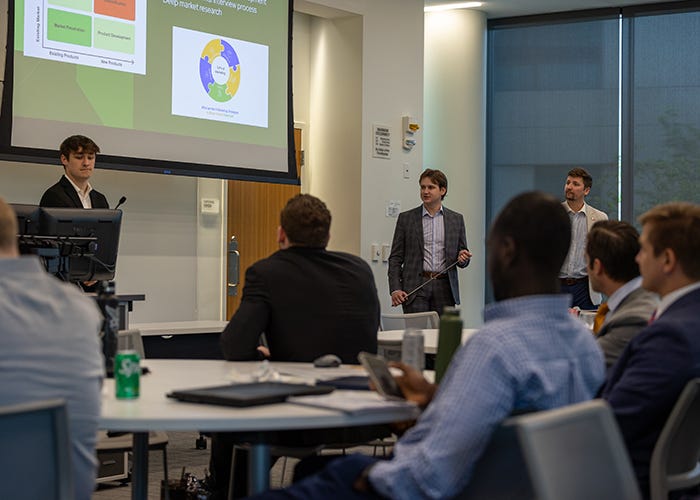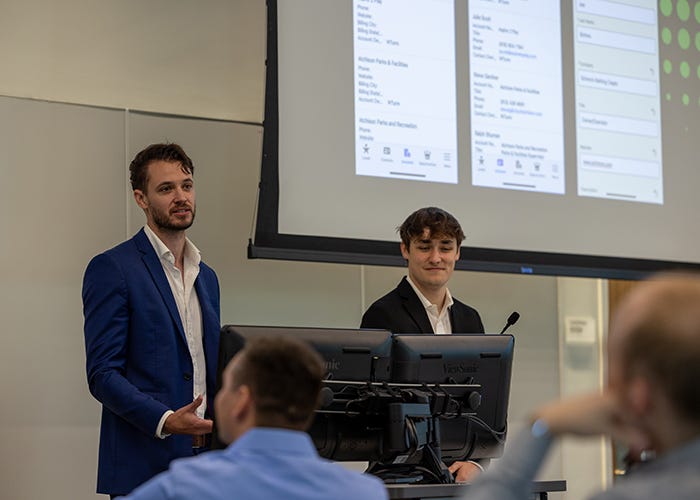MBA capstone courses aid Kansas companies with business solutions
Each year, MBA students enrolled in BUS 810/812 Kansas Small Business Projects spend the academic year working with businesses in the area to apply their skills, gain real-world experiences and learn the ins and outs of how Kansas small businesses function.
The class, led by Will Katz, lecturer in the MBA program, allows students to select from a range of potential clients recruited by Katz based on the clients’ pitches to the class. Based on the clients’ needs, students then act as professional consultants to scope projects, research solutions and finally present their findings directly to the business.

Students worked with businesses ranging from solar and electrical partners to KU Innovation Park to a family-owned artificial turf maintenance company this year. Each group provided varying services for their chosen business. Students left the year with a newfound appreciation and perspective on the small business world and what it takes to succeed as a business in Kansas.
One team spent their semester working with Fix a Field, a family-owned turf maintenance company. The group says they knew they wanted to work with Fix a Field when they heard the owners’ presentation and felt the real passion behind the company.
Students John McGrew and William Turman were part of the team that worked with Brandon Schmidt, the owner, to scale his business and expand his staff. Although Schmidt is the turf expert, he found that he needs help doing the small tasks, which allows him to travel less between fields in the area and focus on the big picture of his business.
“It’s just clear from his tone and how he presented it that despite not being a professional presenter, the guy knew what he was talking about and was really passionate about it,” Turman said. “I think as soon as he ended, John and I walked right up to him so we could have him as our project. We were like, ‘we’re on this before anybody else can take it from us’.”
The group has also worked to take client data and appointment information and digitize it to put it into a CRM, hoping to allow the business to manage its time better and organize schedules.
Throughout the semester, the group faced unforeseen challenges such aligning busy schedules and understanding the technical terms of the industry, but the MBA program and the class helped them overcome these obstacles. McGrew, who’s background is in nursing, found that there were new ways to approach a challenge and that there could be a few different ways to solve a problem.
“I worked in a job that was mostly technical,” McGrew said. “The challenges were what you knew they were going to be, and there was always a simple answer for them. Now going through leadership workshops and some of the things like that, I’m now understanding that there are multiple answers, and they don’t always work perfectly. But we adjust and we adapt. That’s been the thing that’s helped me the most for the MBA program.”
Along with problem-solving skills, these students say that the class has been an important steppingstone in each of their unique journeys. The class also serves as an inside look at Kansas’ small businesses and what it takes to start something from the ground up. Students gain a unique perspective of small businesses and hands-on experience handling real-world problems faced by these companies.

Trent Gould, a master’s student in business analytics from Overland Park, spent his time in the course working with Good Energy Solutions. The company is operated by a KU MBA alumnus Malcolm Proudfit and specializes in commercial and residential solar energy systems and electrical services. It recently acquired Laven Electric, an electrical contractor, and the team faced the challenge of unifying two separate employee handbooks with differing policies and standards. Gould’s group focused on merging the handbooks to create a consistent set of guidelines across both branches and reduce liability.
“This has changed how I view small businesses because it really opens your eyes to what are some different challenges small business are facing,” Gould said. “I guess they do well, and they have good revenue, but they might not have super standard HR practices, things that large corporations might have, so just kind of unique challenges that a small business might face.”
Proudfit completed his MBA at KU six years ago. The class introduced him to Good Energy Solutions, and by the end of the semester, he was offered the position of CFO/COO of the company. Now, as the CEO, Proudfit gets to work with Katz and the class once again, this time on the client side.
“When I was an MBA Student in 2019, I had no idea that my efforts in my BUS 810 class would land me in my dream job right out of school as the CEO of a solar company,” Proudfit said. “It is an awesome full-circle moment to have the chance to work with six talented young MBAs as part of their BUS 810 coursework to complete some much-needed projects at my firm.”
Many students have personal connections or experiences with small businesses prior to this class but are able to expand this knowledge and combine it with their newfound skills. Some students, like McGrew, a Lawrence native, grew up around his family’s small business and found a new respect for the work behind them.
“It’s easy to keep something running; it’s hard to start something,” McGrew said. “That gives me a new appreciation for what my father and what other people have done. Just because these guys are in the thick of it starting it, and I’d see just how many things could go wrong if they didn’t work these 10–12-hour days.”
“As we start looking for jobs, we might find out, we don’t we don’t want to work for anybody’s business and that we can start our own,” said Turman. “Getting the experience, helping these small businesses and seeing what they’ve done makes you believe that you can do something like that. It is something within reach and not only do you believe you can do it, but you also have some skills to do it. And some connections to probably help you do so.”